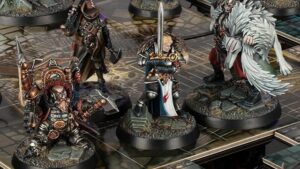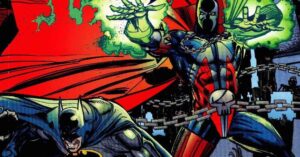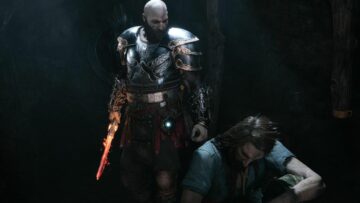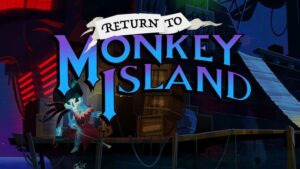Companies spend months waiting to push the button that makes a crowdfunding project go live. They build anticipation on social media, pay for playthroughs and previews by board gaming tastemakers, and host streaming events with potential backers ahead of launch. Then it’s up to the board gaming public to make a game’s concept become a reality. But sometimes things go wrong, as is the case with a spate of recently-launched projects that were canceled a mere 24 hours after launch.
Most notable was the campaign for Restoration Game’s Thunder Road: Vendetta, a reimagining of the 1986 classic about lethal car races set in a Mad Max-style post-apocalypse. Launched on October 12th, the campaign had earned more than $278,000 out of its total ask of $500,000. It was likely that Restoration would make its goal, but limping over the finish line of a high-profile crowdfunding campaign is never a good look. The campaign was canceled on October 13th.

On that same day, Restoration Games co-founder Justin Jacobson left a note for the community explaining his decision. “This is a fantastic game. I just need to do a better job of letting you all see that. And that’s precisely what we’re going to do. So we’ll get back to work.”
In an industry where sales continue to skyrocket on crowdfunding platforms, a successful launch is everything for a board game. But it isn’t always a question of how much is being raised when a Kickstarter or Gamefound campaign launches, but what is being created alongside of it.
“The more folks you have backing early, the more vibrant your community is,” explained Jacobson in an interview with Polygon. “This creates a general level of excitement around the campaign that can encourage folks to spread the word about it on social media.” On the very first day that the campaign went live, Jacobson discovered that the buzz just wasn’t there. Rather than fanning the flames of hype, his team’s time was instead being spent on a much more onerous task.
“If you fumble the launch, you’re spending more time responding to questions and criticism, which doesn’t add backers,” Jacobson explained. “More folks were asking questions than telling us what they liked best. That was the red flag for us.”
Restoration’s last crowdfunded success, Return to Dark Tower from designers Isaac Childres (Gloomhaven) and Rob Daviau (creator of the legacy system and a co-founder of Restoration Games), earned over $4 million dollars by campaign’s end. Return to Dark Tower certainly captured a following, so much so that Barnes & Noble will be offering the game at select locations despite its hefty MSRP ($190).
The bottom line is that a crowdfunding campaign is as much about building a fervent fanbase as it is about raising millions of dollars for a game that is often developed and already being manufactured. If you don’t have one, you won’t need the other. This is part of why Jacobson decided to pull the plug on Thunder Road: Vendetta.
“First and foremost, what do we actually need to make the product viable?” Jacobson said. “That’s particularly important for something like Return to Dark Tower, where the technical requirements and development costs are quite high. [It’s] not simply the amount of money to fund a print run that determines that viability. Often it’s more important to determine what backer count works and then extrapolating the goal by estimating the pledge per backer.”

Different publishers have their own reasons for canceling a campaign shortly after its launch. Sometimes it is a matter of pricing and public perception of what a pledge amount nets them, as many of the commenters in 25th Century Games’ recently canceled Gartenbau expressed. Founder Chad Elkins noted in a post on the pledge site that “There are a ton of components with two large boards and a mountain of tiles, tokens, and constructs… it weighs in at over 5 pounds! That’s a lot of cardboard. We never really showed the magnitude of the components for the price point.”
The quality of components was also a factor that Jacobson and Restoration considered. Scott Miller, a backer on the campaign, posted: “We didn’t really know much about [the components], other than a sales blurb and a list of components. There is simply no way that [expansion content] Carnage at Devil’s Run is worth $40, not for a few game boards and a handful of tokens. If the base game is worth $60 (which I agree that it is), then all the expansions combined are also worth about $60.”
“The main thing [for the relaunch will be] to get more polished graphical elements and compose them better to tell a more complete story of what the game is and how it plays,” said Jacobson. He has pledged to work with illustrator Marie Bergeron and graphic designers Jason Taylor and Lindsay Daviau to improve those aspects ahead of a relaunch to also demonstrate the price point’s fairness.
Crowdfunding often relies on not only delivering a better price point for backers, but also incentives such as upgraded components and stretch goals, such as expansion content, to entice people to pledge. Elkins had both available on Gartenbau, as he told backers in his cancellation post. “[W]e did have some stretch goals planned that would have added more to the value (including another backer-only item) you were getting by pledging on KS. Not having that available at launch […] led to a lot of backers who were not interested in the deluxe [edition] to decide on simply waiting for retail to purchase.”
Jacobson agrees with that perspective. “We look to see what we can add for the Kickstarter to make it appealing to folks to come back rather than wait for a retail release. It’s important that the game stand alone from a retail release so that folks who get it then don’t feel like they’re getting an incomplete game.
“That’s mainly [through] stretch goals,” Jacobson continued. “We can offer a discount of MSRP, and we can offer earlier access. We don’t do exclusives, as we really don’t want to feed into the potentially manipulative sense of [fear of missing out] that can drive some folks [to participate].”
For most publishers, this all adds up to a campaign that would be better served with a retool to improve its perception.
“We look at how the funding goal might impact a potential backer’s view of the project and how it impacts the stretch goal cadence we’ve set for the project,” explained Jacobson.
Thunder Road: Vendetta is eyeing a relaunch sometime in January 2022, which will delay the launch of another Restoration crowdfunded project, Crossbows & Catapults. Jacobson feels responsible.
“In retrospect, I was rash and didn’t do the legwork on what pushing back [the first launch date] would actually mean,” he said. “As it turns out, our delivery date isn’t changing. We’ll just be further along at launch, which is where we should’ve been to begin with.”
Gartenbau, in a quicker turnaround, relaunched on Kickstarter November 9th and met its $12,000 funding goal within the first 24 hours this time. In a more upbeat and promising post to the Kickstarter page, Elkins wrote, “It’s been a long and winding journey for this game. To see it finally coming to fruition is quite special. Thank you for being here and helping make it happen.”
It’s the same feeling that Jacobson is hoping for when Thunder Road: Vendetta relaunches next year.
- "
- &
- 000
- access
- All
- around
- BEST
- board
- Bottom Line
- build
- Building
- Cadence
- Campaign
- canceled
- car
- cars
- case
- Co-founder
- coming
- community
- components
- content
- continue
- Costs
- creator
- Crowdfunding
- Crowdfunding Campaign
- day
- delay
- delivering
- delivery
- despite
- developed
- Development
- DID
- Discount
- discovered
- dollars
- Early
- events
- expansion
- Finally
- First
- founder
- fund
- funding
- game
- Games
- Gaming
- General
- Goals
- good
- here
- High
- hoping
- How
- HTTPS
- i
- illustrator
- Impact
- important
- improve
- Including
- industry
- Interview
- IT
- Job
- journey
- kickstarter
- large
- launch
- launches
- Led
- Level
- Line
- List
- Long
- Manufactured
- Media
- million
- Millions
- money
- months
- offer
- offering
- Other
- participate
- Pay
- People
- perspective
- plastic
- Platforms
- play
- Polygon
- potential
- Previews
- price
- pricing
- Product
- project
- projects
- public
- publishers
- purchase
- quality
- Reality
- reasons
- Requirements
- responsible
- retail
- road
- Run
- sales
- sense
- set
- So
- Social
- social media
- spend
- Spending
- spread
- streaming
- success
- successful
- Technical
- The
- time
- Tokens
- Ton
- us
- value
- View
- W
- wait
- weighs
- What
- What is
- WHO
- within
- Work
- works
- worth
- year











